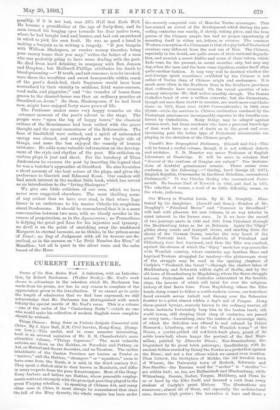Things Chinese: Being Notes on Various Subjects Connected with China.
By J. Dyer Ball, H.M. Civil Service, Hong-Kong. (Samp- son Low.)—This useful, and in some measure interesting, book is an avowed imitation of Mr. B. H. Chamberlain's more attractive volume, Things Japanese." The most valuable articles are those on the Hakkas, on Porcelain and Pottery, on Art, on Mutual and Secret Societies, and on Ta.ouism. The earlier inhabitants of the Canton Province are known as Puntei or "natives," and the Hakkas, " strangers " or "squatters," seem to have come from the North, it is said, in the third century B.C. They speak a dialect akin to that known as Mandarin, and differ in many respects from the pure Kwantungese. Most of the Hong- Kong barbers and tailors are Hakkas, whose peaceable employ- ments contrast strangely with the principal part they played in the great T'aiping rebellion. In speaking of Chinese Art, and many other cosas de China, it must always be remembered that since the fall of the Ming dynasty, the whole empire has been under the scarcely congenial rule of Manchu Tartar sovereigns. This has caused an arrest of the developmont which during the pre- ceding centuries was surely, if slowly, taking place, and the true genius of the Chinese people has had no proper opportunity of asserting itself in either art, letters, or science. The common Western conception of a Chinaman is that of a pig-tailed Tartarised creature very different from the real son of Han. The Chinese, especially in the South, are quite aware of their national degrada- tion, and nourish a secret dislike and scorn of their rulers, which finds vent, for the present, in secret societies only, but may any day, when the man and the hour come together, realise itself after quite another fashion. It may very well be doubted whether the anti-foreign spirit sometimes exhibited by the Chinese is not rather of Tartar than of Chinese origin and sustenance. It is much more often in the Northern than in the Southern provinces that outbreaks have occurred. On the vexed question of mis- sionary enterprise Mr. Ball writes sensibly enough. The Roman Catholics boast of over a million converts ; but the Protestants, though not more than 40,000 in number, are much more real Chris- tians—in 1876, there were 13,000 Communicants ; in 1889, over 37,000—while the services to Chinese civilisation rendered by the Protestant missions are incomparably superior to the benefits con- ferred by Catholicism. Many things may be alleged against mission-work, but those residents who have a personal knowledge of that work have no sort of doubt as to the great and ever- increasing part the hotter type of Protestant missionaries are playing in the elevation of the Chinese people.


































 Previous page
Previous page